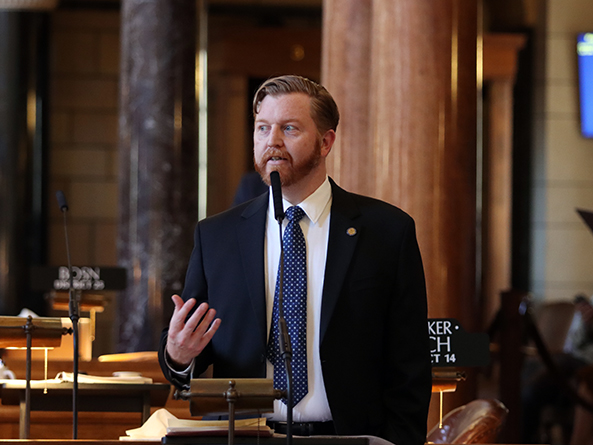Liquor, gaming and vaping package advanced
A proposal to regulate rickhouse operations in Nebraska was amended to become an omnibus bill and advanced from general file March 4.

LB1204, as introduced by Omaha Sen. John Cavanaugh, would define rickhouse under the Nebraska Liquor Control Act as an offsite bonded warehouse that is kept and maintained to store spirits in barrels for aging in order to impart flavor from the barrel into the spirits. The bill also would allow the holder of a microdistillery or spirits manufacturer license to operate a rickhouse in the state if authorized by the Nebraska Liquor Control Commission.
“Allowing [rickhouses] in a manner consistent with federal law will allow the Nebraska distilled spirits industry to grow,” Cavanaugh said.
Lincoln Sen. George Dungan spoke in support of LB1204, saying the provisions would provide assurance of high quality bourbon to Nebraska consumers.
A General Affairs Committee amendment, adopted 41-0, added the provisions of three other measures. Among those additional bills is LB981, sponsored by Bellevue Sen. Rick Holdcroft, which relates to compliance requirements for Charitable Gaming Lottery and Raffle applicants in Nebraska.
Currently, a nonprofit conducting a lottery or raffle is required to pay a quarterly tax on earnings if the lottery exceeds $1,000 in gross proceeds or the raffle exceeds $5,000.
LB981 would adjust the tax filing threshold for nonprofits to $15,000 in gross proceeds for both lotteries and raffles. The provisions also would clarify that qualifying nonprofit organizations would be limited to one lottery or raffle per calendar month that exceeds $15,000. Organizations would be authorized to conduct more than one lottery or raffle if their total gross proceeds do not exceed the threshold.
Holdcroft said the bill was brought on behalf of the state Department of Revenue’s Charitable Gaming Division to help simplify compliance requirements for charitable gaming lottery and raffle applicants.
The committee amendment also includes a bill that would protect the identity of certain lottery winners. Under LB1000, introduced by Plymouth Sen. Tom Brandt, the Charitable Gaming Division and any lottery contractor would be prohibited from disclosing the identity of any person awarded a prize of $250,000 or more except upon written authorization by the prize winner.
Brandt said he brought the bill after hearing stories of lottery winners who struggled mentally and financially after winning big. The “harassment” that winners can experience to give money to family, friends and local organizations has caused some of them to move out of state to escape, he said.
“I do believe the ability to remain anonymous to the public will allow winners to hold onto a sense of normalcy and not leave ‘The Good Life,’” Brandt said. “Nebraska should be a place lottery winners move to to spend their newfound wealth.”
Also included in the committee amendment are the amended provisions of a bill intended to reduce access to vaping devices by minors in Nebraska.
LB1296, introduced by Sen. Jana Hughes of Seward, would prohibit the online sale and delivery of electronic nicotine delivery systems directly to consumers in Nebraska. The bill would not prohibit a retailer from accepting online orders to be picked up at their licensed retail facility.
Hughes said the direct online sale of ENDS has resulted in illegal products of questionable quality and origin being delivered to consumers in the state. Among other provisions, LB1296 would:
• require licensure or certification by wholesalers, retailers and manufacturers of ENDS products;
• require manufacturers to pay a $250 certification fee for each type or model of ENDS product sold in the state;
• prevent the use of packaging and labeling that mimics other consumer products or that conceals a vaping device; and
• require manufacturers to attest that they full comply with federal disclosure requirements.
The bill also would prohibit overseas manufacturers from selling products to retailers and distributors in Nebraska unless they are certified under the measure’s provisions.
“Overall, LB1296 will provide clarity to consumers, retailers and enforcement agencies [about] what products are legal and what are not permitted to be sold in Nebraska,” Hughes said.
Following the adoption of the committee amendment, senators voted 41-0 to advance LB1204 to select file.


